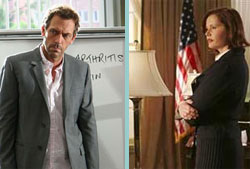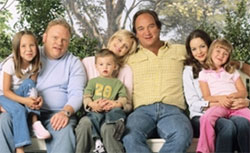April 10, 2006
Dudes in suits, ratings games, scheduling dances — all of the real drama happens...
Behind the Screens
There Is No Right Way to Schedule a Network
by Michael Adams
| People turned on their TV sets in droves, more than
70 million people in fact. What brought so many viewers to their sets
at the same time? The Super Bowl? The Academy Awards? Nope. It was a combination
of ABC's Dancing with the Stars, Fox's American Idol, CBS's
Survivor, and NBC's Olympics coverage of the ladies' figure skating
finals. |
In 1989, the movie
Field of Dreams taught us that if you build it, they
will come. With a little paraphrasing, this could be applied to the network
television game — if you show it, they
might watch. To that end,
an interesting thing happened on February 23, 2006. People turned on their TV
sets in droves, more than 70 million people in fact. What brought so many viewers
to their sets at the same time? The Super Bowl? The Academy Awards? Nope. It
was a combination of ABC's
Dancing with the Stars, Fox's
American
Idol, CBS's
Survivor, and NBC's Olympics coverage of the ladies'
figure skating finals. It was perhaps the single most competitive night network
television has ever seen. Conventional wisdom dictates that four shows cannot
successfully attract an audience in the same time period, but that wisdom was
summarily disproved over the course of one hour on this fateful sweeps Thursday.
(It should be noted that all four shows were unscripted and therefore require
less of a viewer commitment than a scripted series would.) This is the most
extreme example of high-interest programming going head-to-head in a season
that has produced several other heated time slot battles.
 |
Normally, as a season progresses, tough time slots will
work themselves out, with shows being moved out of the path of a more
dominant
foe as the networks realize that there simply isn't enough
love to go around. This year, though, the competition has been more
cutthroat and the networks have stood firm in their decisions to pit
hit shows against each other. The Tuesday 9pm slot has been a
particular logjam for most of this season. It started in September
with six buzzworthy shows in the mix: ABC's
Commander in
Chief, NBC's
My Name Is Earl and
The Office, CBS's
The Amazing Race, Fox's
House, and The
WB's
Supernatural (UPN's
Sex, Love & Secrets never stood a
chance). The general consensus was that something would have to give
in this time slot; there simply was no way that a five-way competition
could produce winners all around. Astonishingly, though, each show
was able to carve out its own niche, with
Commander and
House being the only two that were really targeting the same
female audience.
Despite the shared success in the time slot, it still seemed like at some
point in the season, adjustments would be made to spread the wealth to other
nights. NBC did move its pair of sitcoms to Thursday in an attempt to reestablish
a comedy beachhead on the night, but then turned the Tuesday hour over to
the returning Scrubs. CBS bumped Race to 10pm (it's since been
shifted again, to Wednesday at 8pm), and put The Unit in its place,
only to see the military drama actually build on its already huge NCIS
lead-in. ABC replaced Commander with Sons & Daughters, not exactly
a ratings success, but a must-see show for any true television fan (sadly,
it will be sent away to make room for a second weekly helping of Hope &
Faith and the resurrection of Less Than Perfect). All this is in
addition to The WB's newly introduced Pepper Dennis and UPN's truly
boneheaded move of Veronica Mars to a night where it will no longer
be able to reap whatever benefits were provided by leading out of new episodes
of America's Next Top Model. Keep in mind that we're still talking
about just one time period here!
 |
While quality is always a debatable topic, the quantity and
promotional force of all of these shows residing in the same time slot
is nearly unprecedented. Which leads to the question, Why put so many
eggs in one basket? The answer: the networks are, quite frankly,
just doing their job. Many of the decisions made in this Tuesday time
slot can be looked at as true examples of
counterprogramming, an
increasingly rare occurrence these days. Look no further than the
current Wednesday 10pm battle between three crime shows (CBS's
CSI:
NY, ABC's
The Evidence, and NBC's
Law & Order) to
see that the networks often make the mistake of going after the same
audience in the same time slot. This Wednesday misstep left ABC with
lower ratings than
Invasion was delivering on nights when it
followed an original episode of
Lost, and cost NBC viewers when
it moved
Law & Order up an hour before moving it back two weeks
later. But in the Tuesday-at-9 time slot, there have been distinct
programming options made available to different demographics for much
of the season. These options, and the various types of audience
members that they attract, make it possible for the networks to
program the way they should, as if they actually wanted people to
watch. True, it may not always be convenient for the viewer, but then
again, allowing us to watch everything that's being broadcast isn't
necessarily their concern. With syndication, cable, DVD, and
iTunes
providing more chances than ever to catch with what was missed, the
networks no longer have to worry as much about keeping any single time
slot from becoming too jam-packed. It's a business practice that can
work for and against us: the more they program, the more we watch,
the more money they make, the more they have to spend on good shows
that will more than likely end up competing against each other in the
same time slot.
What makes this practice more than a little frustrating
for the viewer is the fact that so many time slots have so few shows
worth watching. Look just one hour earlier on Tuesday night and you
won't find much to watch if you're not a fan of the screeching
histrionics of American Idol. With the exception of
NCIS and The WB's Gilmore Girls, the networks have
filled the time period with inane sitcoms and repeats, too afraid to
take on the mighty behemoth that is the yearly karaoke competition.
Which takes us back to that Thursday in February, where four shows
successfully coexisted in a time slot that included American
Idol. One can only hope that the networks take this as a sign that
there is an audience outside of Ryan Seacrest's demographic, one that
doesn't care who wins this contest, but also doesn't care what life is
like According to Jim. (Not coincidentally, the networks
schedule more aggressively against Idol's half-hour Wednesday
results show, when they know that viewers will head elsewhere at 9:30,
giving hour-long shows like ABC's Lost and CBS's Criminal
Minds ratings spikes in their second half-hours.)

Do not kneel to our pop music overlords. Please. |
So, as the networks bunker down and prepare to put
together their fall schedules (upfront presentations begin May 15),
what words of advice can be offered to convince them to make things a
little bit easier on the viewer? Don't lie down in front of
American Idol; someday it will be beaten, but not if you
continue to put some of your weakest product against it. Don't clog a
time slot so much that you make viewers choose between too many new
shows and returning favorites; the veteran will almost always succeed,
leaving the new guy to settle for leftovers. Do remember that there
are still viable options for Friday and Saturday night; with enough
promotion, a second- or third-year hit could be effectively
transplanted to one of these more barren evenings. And finally,
imagine for a moment that you aren't the ones making the schedule and
put yourself in the position of the viewer, forced to choose whether
to stick with a beloved program or sample a new show. How would that
make you feel? Overwhelmed, annoyed, maybe a little angry? Are these
feelings that you want to inspire in your viewers?
It's okay to be
competitive, but try to keep things in perspective. Take a minute to
consider how you might make things less complicated for the people who
keep you in business. After all, TV just shouldn't be this hard to
watch.
Email the author.
Return to Season 2, Episode 14.
All written content © 2005-2006 by the authors.
For more information, contact homer@smrt-tv.com



